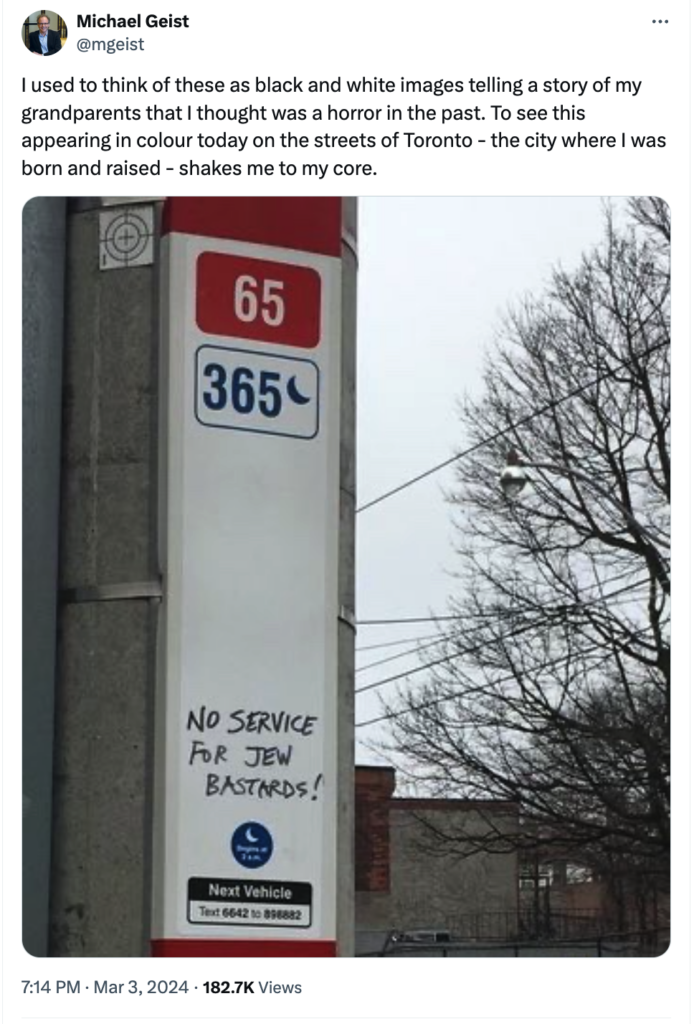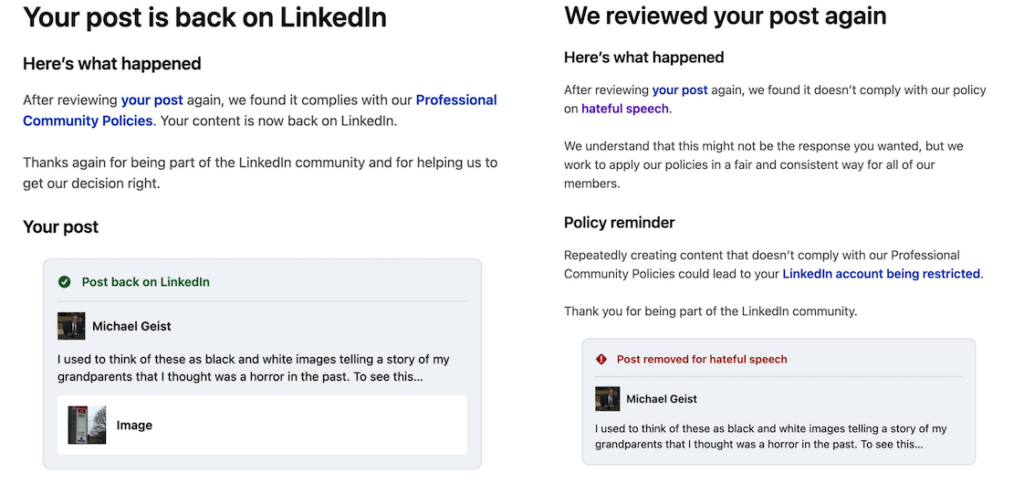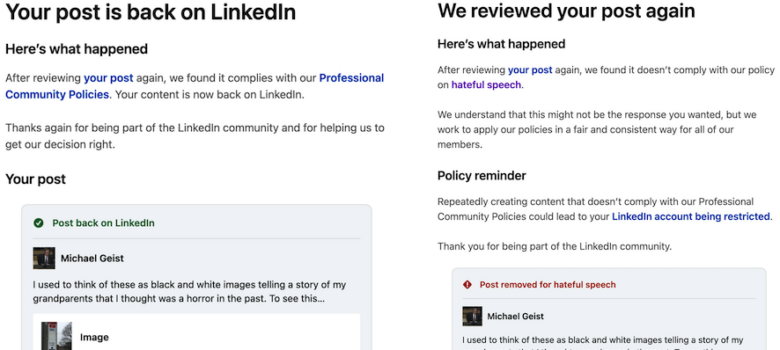The explosive growth of antisemitism in Canada since October 7th is well documented with shooting at schools, the need for a regular police presence at synagogues and community centres, arrests on terrorism offences, and protests targeting Jewish owned businesses and communities. So in that context, some antisemitic graffiti at a bus stop in Toronto over the weekend might have been just one more incident to add to the list that now runs into the hundreds. Yet I found the image of “No Service For Jew Bastards” particularly chilling, evoking memories of the holocaust and of similar hateful messages that have frequently targeted minority communities over the years. I proceeded to post a tweet and a LinkedIn post with the photo and a caption:

Michael Geist tweet, March 3, 2024, https://twitter.com/mgeist/status/1764444323557351869
What came next has left me thinking about the enormity of the challenge of dealing with online hate.
The LinkedIn post was removed within an hour – presumably by automated content moderation – as LinkedIn said the photo violated the site’s hateful speech guidelines. Viewed on its own, that is surely the right call, but when combined with the caption and context, I don’t think it is. I filed an appeal and about 30 minutes later, the post was backup. Hours after that, LinkedIn removed it again, reversing the decision and concluding that it did violate its guidelines.

While I think LinkedIn is wrong in this case, I’m glad it uses content moderation with an appellate process to address content that may violate its guidelines. Transparent content moderation practices with appropriate due process are an essential part of addressing online harms. But the experience highlights the imperfections even of systems that combine automation, human review, and put-back appeal processes that can lead to limitations on freedom of expression.
The experience on Twitter (or X) was even worse. The tweet generated over 150,000 views in 24 hours with thousands of retweets, likes, and comments. While there were many supportive comments, the hate it sparked was breathtaking. I posted a tweet with some of the comments, but they persist now days later with a steady stream of vitriol that would understandably cause many to think twice before wading into an issue such as antisemitic hate. There were numerous reply tweets that unquestionably violate Twitter’s hateful conduct guidelines, but enforcement on the platform rarely occurs. Many have left it as a result, fed up with a self-regulation model that ignores its own guidelines.

Since Bill C-63 on online harms is very much top of mind, it is also worth noting that I don’t think the flawed bill would significantly change the situation either if passed. There would be a duty on the platforms to act responsibly but the standard for fomenting hatred is rightly a high one. Addressing the issue would therefore come primarily as a result of regulatory pressure on platforms to abide by their own policies rather than new legislative requirements. The experience with LinkedIn takedowns highlights the limitations of practices that can have a real impact on freedom of expression.
So if all of these fail, what can be done to counter antisemitic hate? I will start with the painful acknowledgement that it isn’t going away. Indeed, if anything, it has discouragingly become a hallmark of both the extreme right and left. Some will suggest that an end to the conflict in Israel/Gaza will temper the hate, but so many of the comments are focused on Jews and the Jewish community, reviving vile antisemitic tropes that suggest something bigger and more insidious is at play. It is difficult – this post will no doubt spark more of the same – but critical to call it out again and again and again with sustained pressure on both platforms and political and community leaders to take appropriate action.
The failure of our political leaders is particularly jarring as words of support without action have become meaningless. In certain respects, the 2022 Laith Marouf incident, in which a Liberal MP suggested I was racist for calling out the silence of then-Canadian Heritage Minister Pablo Rodriguez for failing to speak out on government funding for an antisemite, was a warning sign. Many MPs said nothing and Rodriguez appears to have lied to committee about what he knew, yet there were no consequences. Not speaking out or taking action in the face of antisemitism is not new and we should have seen this coming.
If there is to be a change, it will have to come from more than just the Jewish community, legislative initiatives, or political leaders that suddenly find some courage. It will require all Canadians committed to equality and combatting hate to make their voices heard and to demand better. Politicians are fond of saying that “this isn’t us” when responding to hate incidents. Yet the reality is that it is. Words alone won’t change that, but real, universal action might.








$20k Month generating income quickly, here are 10 beginner-friendly online jobs that can help you get through a cash shortage. If you’re looking to freelance instead of working directly fV with a company, This website are great starting points.
Go >>>>> https://Cash12Generating12.blogspot.com
We have reached a point in the “west” (and by that I mean western Europe and North America) that one doesn’t question one’s own beliefs nor the statements of others, unless they conflict with our own viewpoint. In a world where “words are violence” we have started to verbally beat down people with conflicting viewpoints, even without actually listening to what they are saying; after all, this could cause one to question one’s own beliefs.
As far as the Marouf affair is concerned, the problem with the Canadian Heritage department is that there is a selection of Ministers responsible. Not only the obvious Minister of Canadian Heritage but also 4 other ministers and their Parliamentary Assistants. This allows the PMO to designate one of the less favoured ministers to do things like apologize for the department’s screw ups. It also effectively hamstrings the concept of Ministerial Responsibility in a Westminister-style parliament like Canada is supposed to have. After all, if there are 5 responsible ministers, who falls on their sword? Of course, the whole concept has fallen out of favour, at least federally, in Canada, even for departments with a single responsible minister or even for the minister’s own failings.
Unfortunately, the perpetually outraged now view Jews as oppressors who have earned all the hate and derision aimed at them. On the other hand, the perpetually outraged feel any criticism of the oppressed is hate that cannot be tolerated. All this is done to further inclusion.
Twitter living up to its reputation, here. Why does anyone still go there? Mastodon isn’t perfect, but it’s got the right answer to dealing with this kind of blatantly hateful noise. The nazis are for the most part effectively confined to instances that tolerate nazis, where they can communicate only amongst themselves and do not pollute the rest of the network. There are still various difficulties and problems to solve when it comes to large-scale content moderation, but the fediverse seems like the only thing around that has the potential to solve them.
I’ve followed @mgeist@mas.to for a few months now but I don’t think I’ve ever seen you interact with anyone there. Accounts that just mirror stuff from twitter do not often get much of a warm welcome on mastodon.
Mastodon is pure libtard hate and ignorance
As the gap between rich and poor gets wider people will continue to find issues where they can exorcise their rage. It’s the same reason why so many people were behind the convoy in Ottawa; people will use whatever issue they can to find an outlet. I’m not saying there is no antisemitism, I’m just saying it’s not near as bad as it seems. If the politicians would improve the lives of the less advantaged there would be far less rage and therefore no need to find an outlet for it.
I suspect that in a number of cases a number of the people are looking for a group to belong to; they decide to join for one or two of the causes that they.promote, and so as to feel more included start to internalize some of the other causes promoted by the leadership of the group. Combine that with a desire to isolate themselves from having their views challenged and you end up with this kind of activity, especially if the leadership has some more extreme attitudes. The term “elite capture” comes to mind, since if you capture the attitudes of the influencers it is far easier to capture their followers.
Oh it’s far worse than it seems.
As a non-Jew, I can’t even get my head around any of this. Where is all the hate and vitriol coming from? Just makes my head spin, my stomach churn, and my heart ache.
In some cases the “protestors” are simply repeating slogans that they’ve heard from the leaders of the protests without actually understanding the meaning of the slogan. For instance, I’ve read stories where some of the protesters, when chanting “from the river to the sea, Palestine shall be free” don’t know basic things like what river and what sea.
Nor do they know the history of what they are protesting, such as the history of Palestine going back more than about 15 years, whereas to really form an understanding of what is going on one needs to look back a couple of thousand years and take into consideration the geopolitics of today. That they don’t seem to be willing to put in the effort to understand the situation leads me to what I wrote in response to Rick above.
It is especially painful to witness our political leaders’ failing since words of support without deeds have become hollow.